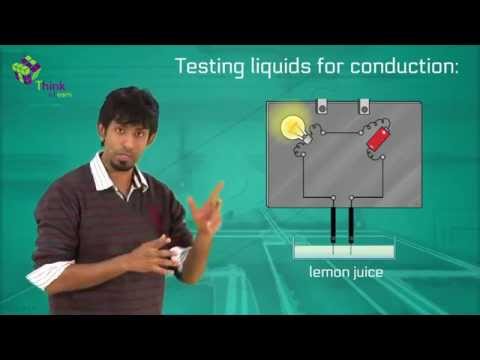The magnitude of charge flow is determined not only by the size of the driving force (voltage) but also by the relative ease with which electrons or ions are allowed to move through the conductor. Substances which allow electricity to pass through them are called conductors. On the other hand, substances which do not allow the electricity to pass through them are called non-conductors or insulators. Conductors do not get decomposed due to the passage of electric current. As the name suggests, they conduct electricity due to the flow of electrons. Metals and their alloys have very good conductance and therefore are simply known as conductors.
1. The unit of conductance cannot be expressed in
- mho
- (ohm)-1
- siemens
- ohm/m
Answer: (d)
2. The SI unit of specific resistance is
- ohm m
- ohm/m
- ohm/m2
- (ohm)-1
Answer: (a)
3. The reciprocal of resistivity of a conductor is
- conductance
- capacitance
- conductivity
- none of these
Answer: (c)
4. In order to measure current in a resistance present in a circuit, the ammeter is connected
- in series
- in parallel
- in series or parallel
- nothing can be decided
Answer: (a)
5. Good conductors have many loosely bound
- atoms
- protons
- molecules
- electrons
Answer: (d)
6. The reciprocal of electrical resistance is
- voltage
- current
- conductance
- none of the above
Answer: (c)
7. The element with the highest conductivity is
- gold
- silver
- copper
- platinum
Answer: (b)
8. As temperature increases electrolytic conduction
- increases
- decreases
- remains unaffected
- none of the above
Answer: (a)
9. The resistance of a conductor varies inversely as
- length
- area of cross-section
- temperature
- Resistivity
Answer: (b)
10. With a rise in temperature, the resistance of semiconductors
- decreases
- increases
- first, increase and then decrease
- remains constant
Answer: (a)
Recommended Video:

Articles on NEET Chemistry:
- NEET Chemistry Syllabus
- NEET Chemistry Important Topics
- NEET Chemistry MCQs
- How to Score 160 Plus in NEET Chemistry
- NEET Chemistry Weightage
- Chemistry Formulas for NEET
Comments